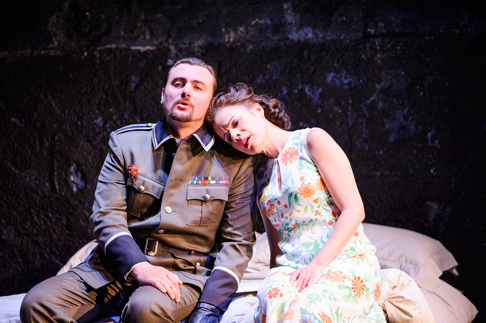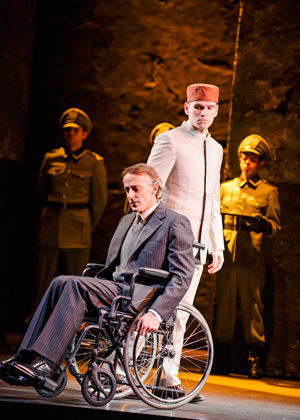![Michael Fabiano as Poliuto [Photo by Tristram Kenton]](http://www.operatoday.com/Poliuto-Glyndebourne-3360.png)
22 May 2015
Poliuto, Glyndebourne
Donizetti’s Poliuto at Glyndebourne could well become one of of the great Glyndebourne classics.
English Touring Opera are delighted to announce a season of lyric monodramas to tour nationally from October to December. The season features music for solo singer and piano by Argento, Britten, Tippett and Shostakovich with a bold and inventive approach to making opera during social distancing.
This tenth of ten Live from London concerts was in fact a recorded live performance from California. It was no less enjoyable for that, and it was also uplifting to learn that this wasn’t in fact the ‘last’ LfL event that we will be able to enjoy, courtesy of VOCES8 and their fellow vocal ensembles (more below …).
Ever since Wigmore Hall announced their superb series of autumn concerts, all streamed live and available free of charge, I’d been looking forward to this song recital by Ian Bostridge and Imogen Cooper.
The Sixteen continues its exploration of Henry Purcell’s Welcome Songs for Charles II. As with Robert King’s pioneering Purcell series begun over thirty years ago for Hyperion, Harry Christophers is recording two Welcome Songs per disc.
Although Stile Antico’s programme article for their Live from London recital introduced their selection from the many treasures of the English Renaissance in the context of the theological debates and upheavals of the Tudor and Elizabethan years, their performance was more evocative of private chamber music than of public liturgy.
In February this year, Albanian soprano Ermonela Jaho made a highly lauded debut recital at Wigmore Hall - a concert which both celebrated Opera Rara’s 50th anniversary and honoured the career of the Italian soprano Rosina Storchio (1872-1945), the star of verismo who created the title roles in Leoncavallo’s La bohème and Zazà, Mascagni’s Lodoletta and Puccini’s Madama Butterfly.
Evidently, face masks don’t stifle appreciative “Bravo!”s. And, reducing audience numbers doesn’t lower the volume of such acclamations. For, the audience at Wigmore Hall gave soprano Elizabeth Llewellyn and pianist Simon Lepper a greatly deserved warm reception and hearty response following this lunchtime recital of late-Romantic song.
Collapsology. Or, perhaps we should use the French word ‘Collapsologie’ because this is a transdisciplinary idea pretty much advocated by a series of French theorists - and apparently, mostly French theorists. It in essence focuses on the imminent collapse of modern society and all its layers - a series of escalating crises on a global scale: environmental, economic, geopolitical, governmental; the list is extensive.
For this week’s Live from London vocal recital we moved from the home of VOCES8, St Anne and St Agnes in the City of London, to Kings Place, where The Sixteen - who have been associate artists at the venue for some time - presented a programme of music and words bound together by the theme of ‘reflection’.
'Such is your divine Disposation that both you excellently understand, and royally entertaine the Exercise of Musicke.’
Amongst an avalanche of new Mahler recordings appearing at the moment (Das Lied von der Erde seems to be the most favoured, with three) this 1991 Mahler Second from the 2nd Kassel MahlerFest is one of the more interesting releases.
‘And there was war in heaven: Michael and his angels fought against the dragon; and the dragon fought and his angels, And prevailed not; neither was their place found any more in heaven … that old serpent … Satan, which deceiveth the whole world: he was cast out into the earth, and his angels were cast out with him.’
If there is one myth, it seems believed by some people today, that probably needs shattering it is that post-war recordings or performances of Wagner operas were always of exceptional quality. This 1949 Hamburg Tristan und Isolde is one of those recordings - though quite who is to blame for its many problems takes quite some unearthing.
There was never any doubt that the fifth of the twelve Met Stars Live in Concert broadcasts was going to be a palpably intense and vivid event, as well as a musically stunning and theatrically enervating experience.
‘Love’ was the theme for this Live from London performance by Apollo5. Given the complexity and diversity of that human emotion, and Apollo5’s reputation for versatility and diverse repertoire, ranging from Renaissance choral music to jazz, from contemporary classical works to popular song, it was no surprise that their programme spanned 500 years and several musical styles.
The Academy of St Martin in the Fields have titled their autumn series of eight concerts - which are taking place at 5pm and 7.30pm on two Saturdays each month at their home venue in Trafalgar Square, and being filmed for streaming the following Thursday - ‘re:connect’.
The London Symphony Orchestra opened their Autumn 2020 season with a homage to Oliver Knussen, who died at the age of 66 in July 2018. The programme traced a national musical lineage through the twentieth century, from Britten to Knussen, on to Mark-Anthony Turnage, and entwining the LSO and Rattle too.
With the Live from London digital vocal festival entering the second half of the series, the festival’s host, VOCES8, returned to their home at St Annes and St Agnes in the City of London to present a sequence of ‘Choral Dances’ - vocal music inspired by dance, embracing diverse genres from the Renaissance madrigal to swing jazz.
Just a few unison string wriggles from the opening of Mozart’s overture to Le nozze di Figaro are enough to make any opera-lover perch on the edge of their seat, in excited anticipation of the drama in music to come, so there could be no other curtain-raiser for this Gala Concert at the Royal Opera House, the latest instalment from ‘their House’ to ‘our houses’.
"Before the ending of the day, creator of all things, we pray that, with your accustomed mercy, you may watch over us."
![Michael Fabiano as Poliuto [Photo by Tristram Kenton]](http://www.operatoday.com/Poliuto-Glyndebourne-3360.png)
Donizetti’s Poliuto at Glyndebourne could well become one of of the great Glyndebourne classics.
It makes a powerful case for the opera, and also for Glyndebourne’s artistic vision. Poliuto isn’t standard repertoire — it’s nothing like L’elisir d’amore — but this brilliant production and performances show what a powerful work it is.
Political repression, religious intolerance and persecution are all too relevant today. Poliuto packs an emotional punch. We should heed its message
Donizetti’s source material was a play by Corneille, written two centuries previously. Polyeucte (Poliuto) was a nobleman in an outpost of the Roman Empire. The opera begins with brooding, murky music with a hushed but fervent chorus. Christians are meeting in secret. Three hundred years after the death of Christ, being a Christian was dangerous. Most early Christians were poor, an underclass inspired by the doctrine of heavenly rewards for earthly suffering. In a militaristic state like Rome, the idea that the meek might inherit the earth would have seemed dangerously subversive, tantamount to overthrowing the basic values of social order. Towering columns of what appear to be rough-hewn stone overwhelm the figures below, at once a depiction of the harsh conditions Christians faced, yet also the strength of their faith.
 Igor Golovatenko as Severo and Ana María Martínez as Paolina
Igor Golovatenko as Severo and Ana María Martínez as Paolina
The opera begins with murky music suggesting shadows, and a hushed but fervent chorus. Into this darkness Poliuto (Michael Fabiano) appears. He’s a nobleman, an outsider. Is he a spy? His friend, Nearco (Emanuele D’Aguanno), is a convert. and Poliuto wants to find out why this strange new faith holds such allure. Poliuto’s troubled because he knows that his wife Paolina (Ana María Martínez) is still in love with Severo ( Igor Golovatenko), who she thought had died. Since Severo is now a Proconsul, with authority direct from Rome, this love triangle has toxic political complications. Severo’s costume suggests Mussolini, who defined Fascism. His guards resemble Mussolini’s secret police. With a wry tough sense of humour, director Mariame Clément has them smoking cigarettes.
Enrique Mazzola, a bel canto specialist, conducted the London Philharmonic Orchestra. Last November, Mark Elder conducted Les Martyrs, the French version of Poluito which Donizetti created for Paris when Poliuto was banned in Naples. The LPO aren’t a period instrument orchestra like the Age of Enlightenment for Opera Rara, but Mazzola used that to advantage, creating an almost Verdian richness of colour from the relatively small forces of a Donizetti orchestra. Mazzola seems to inspire great enthusiasm from his players. Hopefully, we’ll hear much more of him at Glyndebourne (and in London) in the future.
 Timothy Robinson as Felice and Michael Fabiano as Poliuto
Timothy Robinson as Felice and Michael Fabiano as Poliuto
Severo and Paolina snatch a few moments together. Martínez executed Paolina’s arias with such beauty that her voice seemed to shimmer. Good casting, since divine light seems to permeate this opera, despite the gruesome nature of the narrative. Donizetti gilds the vocal line with almost minimalist grace — delicately plucked strings, a single low flute, and the sound of the harp. For a moment, an image of a flowering tree is projected on the walls behind her Martínez’s voice blossoms with warmth that’s all too soon extinguished. When she and Golovatenko sing together, they’re singing love duets tinged with frustration and regret. Paolina, though, is a paragon of virtue, a concept both Roman and Christian.
Regimes that feel threatened turn to extremes. In the Temple of Jupiter, the crowds are whipped up to bloodthirsty frenzy. Some of the chorus had been singing Christians earlier, or Roman guards: interesting irony. Matthew Rose ‘s firmly focused bass created Callistene, the High Priest with great authority. With Severo wavering, and and Poliuto turning Christian, it’s up to him to hold up the foundations of the Roman Empire But Poliuto isn’t afraid of death. He believes in the resurrection: worldly concerns are no match. The purity of Michael Fabiano’s tenor rings so cleanly that Paolina is convinced that any faith that can conquer death is one worth having, even if it means leaving her father Felice (Timothy Robinson) singing from a wheelchair, to underline his inability to morally stand on his own two feet. When Poliuto and Paolina die, we don’t need to see blood and guts. Being True Believers, they’re simply transformed in a blaze of light. The designs (Julia Hansen and Bernd Purkrabek) with video projections, by fettFilm (Momme Hinrichs and Torge Möller) were extraordinarily beautiful. Gorgeous washes of colour. Sets that move as seamlessly as this, and transform with such subtlety are a thing of wonder. Like Paolina, I thought I could hear the angels sing.
Anne Ozorio